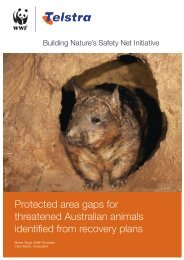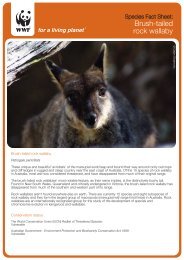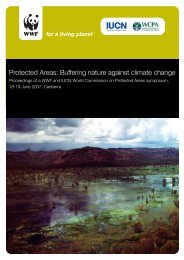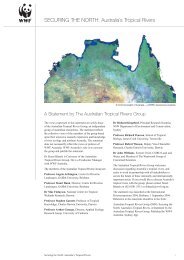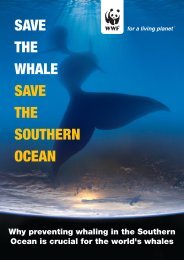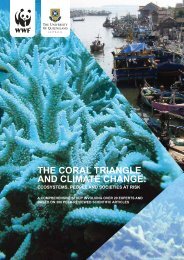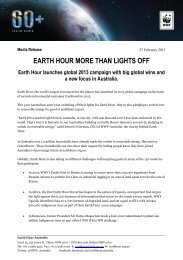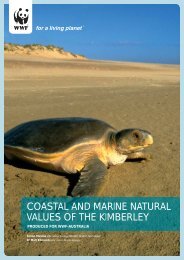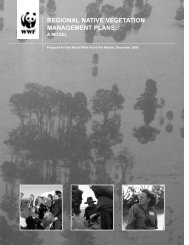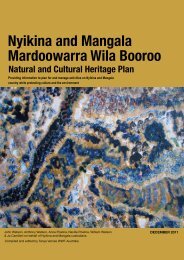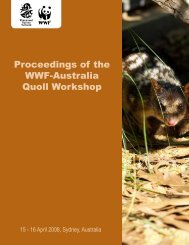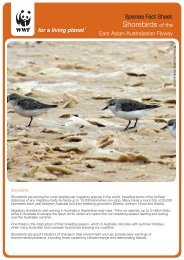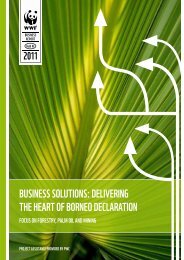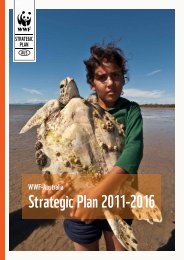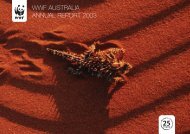Indigenous Peoples and Conservation Organizations
Indigenous Peoples and Conservation Organizations
Indigenous Peoples and Conservation Organizations
You also want an ePaper? Increase the reach of your titles
YUMPU automatically turns print PDFs into web optimized ePapers that Google loves.
66 The Xavante in Central Brazil<br />
Because funders <strong>and</strong> outside actors did not easily<br />
grasp the intricacies of Xavante society, they also<br />
misread the importance of the cultural mediator<br />
at the heart of a cluster of community projects.<br />
Too much was invested in a single individual<br />
who was presumed to speak for the community.<br />
Although he enjoyed wide acceptance at the<br />
beginning of the project, this changed over time<br />
as he began to use access to outside resources to<br />
leverage internal influence. Funders need to<br />
underst<strong>and</strong> that their mere presence, <strong>and</strong> the<br />
access to resources that they offer, can alter the<br />
playing field of community dynamics even if<br />
there is no overt attempt on their part to do so.<br />
One can also argue that some problems that hindered<br />
the wildlife management effort might have<br />
been ameliorated had representatives of other<br />
factions been more actively involved in the management<br />
of the Xavante association. (Although<br />
WWF made several attempts to include other factions<br />
of the village, including the chief, it was<br />
never clear to the organization how much they<br />
should push on this issue.) This is not just a<br />
question about politics <strong>and</strong> diplomacy. It also<br />
involves a question about what kind of information<br />
is needed to make a project viable. Western<br />
science can provide tools to help the Xavante<br />
confirm in detail what they already suspect, that<br />
game is growing scarce, but the best scientific<br />
solution will not work if the Xavante do not<br />
underst<strong>and</strong> it <strong>and</strong> are unwilling to support it.<br />
A process of hunting culture recovery was<br />
already under way, but things might have moved<br />
more smoothly in the project if ethnographic<br />
monitoring had occurred in t<strong>and</strong>em with biological<br />
data gathering. An anthropologist or outsider<br />
with in-depth knowledge of the culture working<br />
in rapport with the technical staff from the outset<br />
might have realized sooner that the project time<br />
frame had to be longer. Such a person could<br />
also have helped build a conceptual framework<br />
that would minimize disruptions from staff<br />
turnover that are inevitable in any long-term<br />
project. More importantly, difficult concepts<br />
might have been easier to translate into terms<br />
that the Xavante could underst<strong>and</strong>. And such an<br />
individual might in turn have facilitated scientists’<br />
underst<strong>and</strong>ing of Xavante concerns. A<br />
conscious process might have been engaged that<br />
would have helped the Xavante to look sooner at<br />
what aspects of their hunting culture <strong>and</strong> newly<br />
sedentary lifestyle were contributing to game<br />
depletion <strong>and</strong> what hidden resources were dormant<br />
within the culture as possible solutions.<br />
Fortunately the first research biologist understood<br />
the need to work closely with the Xavante in his<br />
fieldwork <strong>and</strong> had the rare interpersonal skills to<br />
do so. But the informational net might have been<br />
cast more widely since hunting cannot be separated<br />
from questions about Xavante lifestyle in<br />
general. Women, whose role in community<br />
affairs must not be underestimated, had very little<br />
underst<strong>and</strong>ing of the project. The need for them<br />
to do so may not have been obvious since men<br />
are the principal hunters, <strong>and</strong> the biologists were<br />
unlikely to think about women’s relationship to<br />
the project since they relied on the warã as the<br />
venue for communications. Although the warã is<br />
the arena for public decision making <strong>and</strong> discussion,<br />
in fact most important matters are discussed<br />
<strong>and</strong> decided upon in meetings that take place outside<br />
its sphere (Graham 1993). Had outsiders<br />
more actively sought to communicate in these<br />
forums, women might have had a greater chance<br />
of indirect participation <strong>and</strong> more opportunities to<br />
gain underst<strong>and</strong>ing <strong>and</strong> make their voices heard<br />
(see Graham 1992, 1995). Xavante male leaders<br />
did not welcome such overtures <strong>and</strong> actively<br />
sought to discourage them. However, closer<br />
ethnographic monitoring from the beginning<br />
might have helped open doors <strong>and</strong> provided<br />
access to new information <strong>and</strong> a wider perspective<br />
on project means <strong>and</strong> goals. It might also<br />
have helped funders identify the roots of emerging<br />
problems <strong>and</strong> begin a dialogue with one<br />
another <strong>and</strong> with the Xavante to resolve them.<br />
Important decisions lie ahead for the Xavante.<br />
Establishing refuges is provisional, pending the<br />
results of ongoing monitoring. Since 1991 the<br />
Xavante have been encouraged to hunt away<br />
from their home village. With hunters driving to<br />
distant zones, it is likely that pressure on game<br />
has actually increased throughout the reserve.<br />
The system of refuges may suffice for a while,<br />
although additional species may have to be protected.<br />
If source areas are encroached upon,<br />
which may occur as Xavante population<br />
increases, some species may dwindle dangerously.<br />
Fortunately, as their history shows,<br />
Xavante are expert at adapting to new situations.



